0 Comments
Diego looks up from the papers scattered across the battered table which is serving as the only desk in the office. On seeing Nerita, Sefu, and Felicity in the doorway, he stands, nearly knocking over the equally battered chair. He has to move around the boxes of papers, uniforms, and other assorted supplies and gear stacked around the room. Nerita surveys the chaos with a rapidly deepening scowl.
“Still no furniture?” Diego sighs, “No furniture, no cleaning or laundry service... we're only getting meals because Joey and Ivy spoke to the head cook directly. Much as we're used to doing all that sh*t ourselves, it's f***ing ridiculous.” “Beyond,” Nerita is more than willing to agree with the sentiment, “Come with us, please.” Diego ensures the office door is locked before accompanying Nerita, Sefu, and Felicity up to the throne room. Court isn't in session, but the monarch is seated on his throne. Crown Prince Derian is standing nearby, his expression hard to read. Facing the monarch is the captain of the palace guard, who looks upset and defensive. The monarch looks past him as Nerita leads those with her over to the group. He indicates for Nerita to be seated on the other throne, which she is very relieved to do. As Felicity moves to stand just behind Nerita's seat, the door opens again, this time to admit Ford. Diego can't quite conceal a wince on seeing Ford's expression. “Now,” Monarch Reginald's eyes pass over the men standing before him, “This situation is becoming utterly ridiculous. My orders are to be obeyed, regardless of what they are or on whose behalf they're issued.” Han's expression grows stormy. The monarch turns to Diego, “Has anything been done as requested?” “No, your majesty.” “Have you been able to get any of what you need?” “Some things.” The monarch returns his attention to Han, “Is there a particular reason for this continued subversion of my orders? I presume if you aren't doing it yourself, you know who is.” Han's eyes go to the floor. “You gain nothing by this,” Monarch Reginald continues, “But I don't think you understand just what you have to lose.” “You think it possible to replace me?” Han's expression turns skeptical. “The Sword certainly does,” Ford speaks before anyone else can, “It also considers Her Majesty's Guard a necessity, whether you agree or not.” “Her Majesty's guard hasn't been necessary in centuries,” Han's scowl returns, “And the Sword hasn't either. Why anyone would listen to some fancy piece of metal that's been out for reality for so long...” He breaks off as Ford's expression turns dangerous. Even as Ford starts towards Han, Diego, recognizing the potential for trouble, moves to intercept and ends up having to block a blow which nearly knocks him down. When Ford tries to move around him, Diego applies the quickest, dirtiest take down he knows. As he does, he turns to catch his wife's eye. Felicity nods, clearly understanding the silent communication, and comes over to help Diego pick Ford up and remove him from the room. Out in the corridor, Ford slumps against the wall, still scowling, but not attempting to fight either of the other two. Finally, he straightens up, turning to Diego. “Thanks.” “Let me guess,” Diego grimaces, “He's been pissing off you and the Sword?” Ford nods, “Fairly consistently for months now. Unfortunately, he's right about being hard to replace at the moment.” “Well,” Diego takes a deep breath, “Much as I know the Sword wants to see this taken care of, let me deal with it.” Ford nods again, “You two should get back in there. I'm going home for a bit.” He walks away while Diego and Felicity return to the throne room. She returns to her position behind Nerita while her husband addresses Han. “Do you know what the term berserk means?” Han frowns, “What...?” “You're real lucky I know Ford an' his history as well as I do,” Diego continues, “Have you ever been in a serious fight in your life?” Han looks away, making no attempt to answer. “Certainly not in many years,” Derian speaks up, “Is Ford still here?” Diego shakes his head, “Better for everyone involved if he's away from here for a while. You really don't want to know what he's capable of when he loses it.” Nerita chuckles grimly, “I can take a guess.” “Anyway,” Diego returns his attention to Han, “I don't think you quite understand the situation. I can't save your *ss if there's a real attack on anyone here 'cause I have my own job to do.” “Very true,” Monarch Reginald sounds stern, “And you need the resources and equipment you're supposed to have in order to do that job. How long until your people begin to arrive?” “Two days, your majesty.” “Do you have enough of anything to feed, clothe, or shelter as many people as you're expecting?” “Not even close.” The monarch nods to himself, “That needs to change now. I will be reissuing all orders for the cleaning and furnishing of your wing, to be completed today and tomorrow. If there is any interference, I want to know immediately. I also want to be sent a message once the work is completed to your satisfaction.” “Yes, your majesty.” Diego bows his head. At a sharp inhale, all eyes go to Nerita. Derian moves to her side immediately. “Still...” Nerita is only breathing shallowly, “False labour.” Derian frowns, even as he nods. Monarch Reginald returns his gaze to Diego, “I suspect your time to prepare will be limited.” Diego just nods.
Derian speaks up, “So what more is going on?”
“Increased anti-monarchy activity all across the continent,” Ford scowls, “The monarchs in Ouestlun and Midkingsen won't even acknowledge the Sword right now. Their heirs are somewhat more willing, but also currently restricted in what they can authorize. That will change in time, but here in Norsecount, something needs to be done.” “The MSS?” Derian queries. “The director claims he has neither the manpower nor the resources necessary,” The monarch looks grim, “The situation is such I can justify increasing his resources, but how to do that in such a way as to ensure the funds go where they ought. Too often MSS 'special projects' cause as many issues as they resolve.” Ford snorts, “Norsecount's been at relative peace too long.” “What about adding a new branch specifically to tackle the issue?” Derian suggests, “If it could be headed up by someone with experience dealing with these people, such as a grad of Experiment Redemption...” “Be best,” Ford nods to himself, “Natalia might have some thoughts on who would be available to take the position.” “Oh, undoubtedly,” Monarch Reginald grimaces, “Still, it's the best suggestion made yet. Probably best if said branch employs Experiment Redemption grads from the top position on down. Save on some training.” Again, Ford nods, “An' that will help with information gathering an' a few other things, but the Norsecount Militia Reserve needs additional training... before you start seriously losin' people.” The monarch nods, “While I know the commander isn't a fan of yours, it might be best if you're in on that discussion. I have no idea what more they could be taught which would actual serve to help. Is there anything else?” “Her Majesty's Guard needs reviving.” Ford looks serious, what of his face can be seen around his dark glasses. Monarch Reginald nods to himself, “Protection specific to the monarch's consort and her children. I have a feeling that won't go over well in certain quarters.” Nerita adds, “If you think I'm gonna trust the general run of those from Arawn with that kind of training...” Ford snorts laughter, “I'll have a word with Natalia regarding who might be available to serve as captain or captains. But how about carefully screened Experiment Redemption grads?” “Would be better.” I think, rather than struggle for blog content this week... and the next few... I will give myself a break. I may or may not be back in November. That will depend whether I attempt Nanowrimo this year. Feel free to re-read your favourite old posts until I get back to posting new content.
|
AuthorAlexandra A. 'Lexa' Cheshire is the author of numerous novels and short stories published through Howling Wolf Books. Lexa is a wife, mother, cat owner, and music lover. Archives
January 2024
Categories
All
|
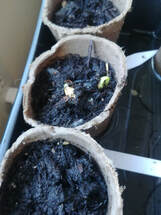
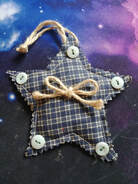

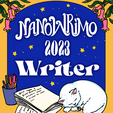
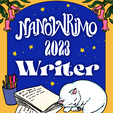
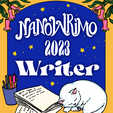
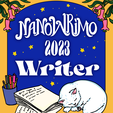
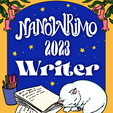

 RSS Feed
RSS Feed
